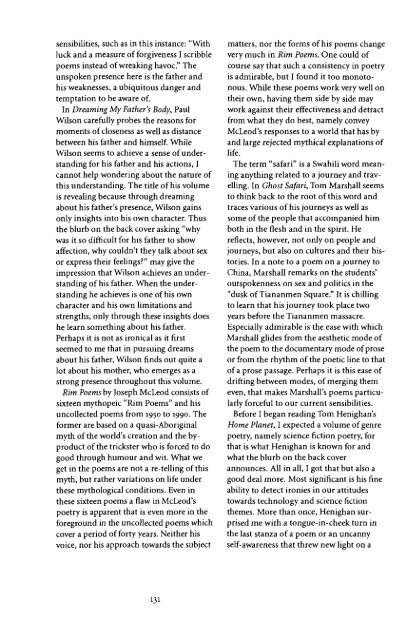A Quarterly of Criticism and Review i^^^^^^^^fcEjfc $15
A Quarterly of Criticism and Review i^^^^^^^^fcEjfc $15
A Quarterly of Criticism and Review i^^^^^^^^fcEjfc $15
Create successful ePaper yourself
Turn your PDF publications into a flip-book with our unique Google optimized e-Paper software.
sensibilities, such as in this instance: "Withluck <strong>and</strong> a measure <strong>of</strong> forgiveness I scribblepoems instead <strong>of</strong> wreaking havoc." Theunspoken presence here is the father <strong>and</strong>his weaknesses, a ubiquitous danger <strong>and</strong>temptation to be aware <strong>of</strong>.In Dreaming My Father's Body, PaulWilson carefully probes the reasons formoments <strong>of</strong> closeness as well as distancebetween his father <strong>and</strong> himself. WhileWilson seems to achieve a sense <strong>of</strong> underst<strong>and</strong>ingfor his father <strong>and</strong> his actions, Icannot help wondering about the nature <strong>of</strong>this underst<strong>and</strong>ing. The title <strong>of</strong> his volumeis revealing because through dreamingabout his father's presence, Wilson gainsonly insights into his own character. Thusthe blurb on the back cover asking "whywas it so difficult for his father to showaffection, why couldn't they talk about sexor express their feelings?" may give theimpression that Wilson achieves an underst<strong>and</strong>ing<strong>of</strong> his father. When the underst<strong>and</strong>inghe achieves is one <strong>of</strong> his owncharacter <strong>and</strong> his own limitations <strong>and</strong>strengths, only through these insights doeshe learn something about his father.Perhaps it is not as ironical as it firstseemed to me that in pursuing dreamsabout his father, Wilson finds out quite alot about his mother, who emerges as astrong presence throughout this volume.Rim Poems by Joseph McLeod consists <strong>of</strong>sixteen mythopeic "Rim Poems" <strong>and</strong> hisuncollected poems from 1950 to 1990. Theformer are based on a quasi-Aboriginalmyth <strong>of</strong> the world's creation <strong>and</strong> the byproduct<strong>of</strong> the trickster who is forced to dogood through humour <strong>and</strong> wit. What weget in the poems are not a re-telling <strong>of</strong> thismyth, but rather variations on life underthese mythological conditions. Even inthese sixteen poems a flaw in McLeod'spoetry is apparent that is even more in theforeground in the uncollected poems whichcover a period <strong>of</strong> forty years. Neither hisvoice, nor his approach towards the subjectmatters, nor the forms <strong>of</strong> his poems changevery much in Rim Poems. One could <strong>of</strong>course say that such a consistency in poetryis admirable, but I found it too monotonous.While these poems work very well ontheir own, having them side by side maywork against their effectiveness <strong>and</strong> detractfrom what they do best, namely conveyMcLeod's responses to a world that has by<strong>and</strong> large rejected mythical explanations <strong>of</strong>life.The term "safari" is a Swahili word meaninganything related to a journey <strong>and</strong> travelling.In Ghost Safari, Tom Marshall seemsto think back to the root <strong>of</strong> this word <strong>and</strong>traces various <strong>of</strong> his journeys as well assome <strong>of</strong> the people that accompanied himboth in the flesh <strong>and</strong> in the spirit. Hereflects, however, not only on people <strong>and</strong>journeys, but also on cultures <strong>and</strong> their histories.In a note to a poem on a journey toChina, Marshall remarks on the students'outspokenness on sex <strong>and</strong> politics in the"dusk <strong>of</strong> Tiananmen Square." It is chillingto learn that his journey took place twoyears before the Tiananmen massacre.Especially admirable is the ease with whichMarshall glides from the aesthetic mode <strong>of</strong>the poem to the documentary mode <strong>of</strong> proseor from the rhythm <strong>of</strong> the poetic line to that<strong>of</strong> a prose passage. Perhaps it is this ease <strong>of</strong>drifting between modes, <strong>of</strong> merging themeven, that makes Marshall's poems particularlyforceful to our current sensibilities.Before I began reading Tom Henighan'sHome Planet, I expected a volume <strong>of</strong> genrepoetry, namely science fiction poetry, forthat is what Henighan is known for <strong>and</strong>what the blurb on the back coverannounces. All in all, I got that but also agood deal more. Most significant is his fineability to detect ironies in our attitudestowards technology <strong>and</strong> science fictionthemes. More than once, Henighan surprisedme with a tongue-in-cheek turn inthe last stanza <strong>of</strong> a poem or an uncannyself-awareness that threw new light on a131
















